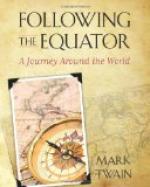message I only needed to charm the way to it with
wonders, marvels, miracles. With full confidence
I told the wonders performed by Samson, the strongest
man that had ever lived—for so I called
him.
“At first I saw lively anticipation and strong interest in the faces of my people, but as I moved along from incident to incident of the great story, I was distressed to see that I was steadily losing the sympathy of my audience. I could not understand it. It was a surprise to me, and a disappointment. Before I was through, the fading sympathy had paled to indifference. Thence to the end the indifference remained; I was not able to make any impression upon it.
“A good old Hindoo gentleman told me where my trouble lay. He said ’We Hindoos recognize a god by the work of his hands—we accept no other testimony. Apparently, this is also the rule with you Christians. And we know when a man has his power from a god by the fact that he does things which he could not do, as a man, with the mere powers of a man. Plainly, this is the Christian’s way also, of knowing when a man is working by a god’s power and not by his own. You saw that there was a supernatural property in the hair of Samson; for you perceived that when his hair was gone he was as other men. It is our way, as I have said. There are many nations in the world, and each group of nations has its own gods, and will pay no worship to the gods of the others. Each group believes its own gods to be strongest, and it will not exchange them except for gods that shall be proven to be their superiors in power. Man is but a weak creature, and needs the help of gods—he cannot do without it. Shall he place his fate in the hands of weak gods when there may be stronger ones to be found? That would be foolish. No, if he hear of gods that are stronger than his own, he should not turn a deaf ear, for it is not a light matter that is at stake. How then shall he determine which gods are the stronger, his own or those that preside over the concerns of other nations? By comparing the known works of his own gods with the works of those others; there is no other way. Now, when we make this comparison, we are not drawn towards the gods of any other nation. Our gods are shown by their works to be the strongest, the most powerful. The Christians have but few gods, and they are new—new, and not strong; as it seems to us. They will increase in number, it is true, for this has happened with all gods, but that time is far away, many ages and decades of ages away, for gods multiply slowly, as is meet for beings to whom a thousand years is but a single moment. Our own gods have been born millions of years apart. The process is slow, the gathering of strength and power is similarly slow. In the slow lapse of the ages the steadily accumulating power of our gods has at last become prodigious. We have a thousand proofs of this in the colossal




